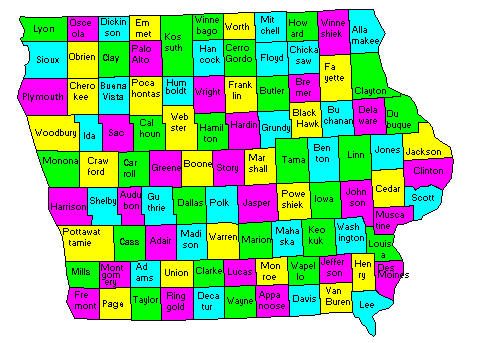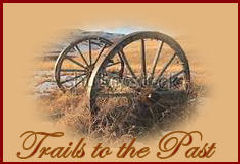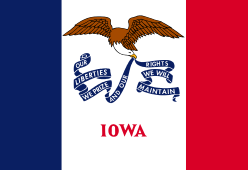|
Trails
to the Past of Iowa is accepting any donations of
genealogy materials that you may have such as marriage
announcements, news articles, old obituaries, births,
(you do not need the birth certificate) just the
information, and biographies. If you have any of
these items please contact me Marie
Miller the Iowa State
Administrator.
The Black Hawk War
was a brief conflict between the United States and
Native Americans led by Black Hawk, a Sauk leader. The
war erupted soon after Black Hawk and a group of Sauks,
Meskwakis, and Kickapoos, known as the "British Band",
crossed the Mississippi River, into the U.S. state of
Illinois, from Iowa Indian Territory in April 1832.
Black Hawk's motives were ambiguous, but he was
apparently hoping to avoid bloodshed while resettling on
tribal land that had been ceded to the United States in
the disputed 1804 Treaty of St. Louis.
U.S. officials, convinced that
the British Band was hostile, mobilized a frontier
militia and opened fire on a delegation from the Native
Americans on May 14, 1832. Black Hawk responded by
successfully attacking the militia at the Battle of
Stillman's Run. He led his band to a secure location in
what is now southern Wisconsin and was pursued by U.S.
forces. Meanwhile, other Native Americans conducted
raids against forts and settlements largely unprotected
with the absence of U.S. troops. Some Ho-Chunk and
Potawatomi warriors with grievances against
European-Americans took part in these raids, although
most tribe members tried to avoid the conflict. The
Menominee and Dakota tribes, already at odds with the
Sauks and Meskwakis, supported the U.S.
Commanded by General Henry
Atkinson, the U.S. troops tracked the British Band.
Militia under Colonel Henry Dodge caught up with the
British Band on July 21 and defeated them at the Battle
of Wisconsin Heights. Black Hawk's band was weakened by
hunger, death, and desertion and many native survivors
retreated towards the Mississippi. On August 2, U.S.
soldiers attacked the remnants of the British Band at
the Battle of Bad Axe, killing many or capturing most
who remained alive. Black Hawk and other leaders
escaped, but later surrendered and were imprisoned for a
year.
The Black Hawk War gave the
young captain Abraham Lincoln his brief military
service, although he never participated in a battle.
Other participants who later became famous included
Winfield Scott, Zachary Taylor, and Jefferson Davis. The
war gave impetus to the U.S. policy of Indian removal,
in which Native American tribes were pressured to sell
their lands and move west of the Mississippi River and
stay there.
|
On Line
Data |
|

| |
Cities
Cedar Falls
Dunkerton
Elk
Run
Heights
Evansdale
Gilbertville
Hudson
Janesville
Jesup
La
Porte
City
Raymond
Waterloo
Census-designated
place
Washburn
Other unincorporated
communities
Dewar
Eagle
Center
Finchford
Glasgow
Voorhies
Townships
Barclay
Bennington
Big
Creek
Black Hawk
Cedar
Cedar
Falls
Eagle
East
Waterloo
Fox
Lester
Lincoln
Mount
Vernon
Orange
Poyner
Spring
Creek
Union
Washington
|

|
The
information on Trails to the Past copyright © may be used in personal family history research, with source citation. The pages in entirety may not be duplicated for publication in any fashion without the permission of the owner. Commercial use of any material on this site is not permitted. Please respect the wishes of those who have contributed their time and efforts to make this free site possible.~Thank you!
|



